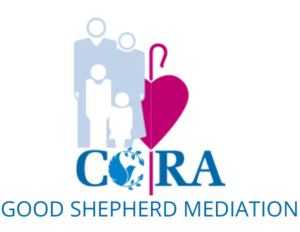Good Shepherd Mediation

PROVIDING CONFLICT MANAGEMENT AND CONFLICT RESOLUTION SERVICES THROUGH MEDIATION AND RESTORATIVE JUSTICE MODELS.
Overview:
CORA Good Shepherd Mediation (formerly Good Shepherd Mediation Program) was established by the Sisters of the Good Shepherd as a neighborhood justice center located in Northwest of Philadelphia. People in conflict come to the Mediation Program to resolve their disputes through mediation. Since its’ inception, Good Shepherd has grown to provide mediation and restorative justice practices throughout the Philadelphia community.
Our mission is to encourage peace, reconciliation, and social justice by empowering individuals to resolve conflicts.
What is Mediation?
Mediation is a confidential process designed to resolve disputes with the help of a trained, neutral third-party called a “mediator.”
The mediator does not offer advice or make a decision for the parties. The mediator facilitates the communication session, encourages peacemaking and writes the agreement if one is reached. Eighty-five percent of the disputes that reach mediation result in a written settlement agreement between the parties.
Mediation is informal, confidential, and inexpensive. Mediation sessions can be scheduled within a few weeks at a location in the disputant’s neighborhood. Mediation is used successfully to resolve interpersonal disputes involving families, friends, neighbors, employers and employees, consumers and merchants, landlords and tenants, and others.
What is Restorative Justice?
Restorative Justice is a communal and trauma-informed approach to repairing harm that supports those who were harmed in identifying what they need in order to heal and supports those who caused harm in taking accountability for their actions and finding the tools necessary to transform their behavior. Restorative Justice can be used to address interpersonal and intragroup conflict.
At CORA Good Shepherd Mediation, we offer a range of restorative practices tailored to fit each participant’s specialized needs. All restorative models begin with a comprehensive intake process, which allows parties to reflect on what has occurred and permits the facilitator to assess the situation and draft a proposal for how to move forward. Most proposals include a group dialogue that invites the involved parties, and whoever they select as a support person, to meet face-to-face in a structured and secure environment to establish a mutual understanding of the events that transpired and collectively brainstorm a plan of action to repair the harm.
Programs and Services
CORA Good Shepherd Mediation is a nonprofit organization that currently includes the following components: Community Mediation; Conflict Coaching; Restorative Justice models, Youth Diversion Programs, and Training and Consulting. The training and consulting services include: mediation orientation; adult mediator training; youth peer-mediation training and school-based program implementation; conflict resolution; meeting facilitation; anger management; community peacemaking; collaboration building for community empowerment; and dealing with differences.
On the average, each year, CORA GSM:
- Mediates 50 community disputes with a settlement rate of 825 percent.
- Facilitates 1,263 pre-hearing conferences in the Dependency Unit of the Philadelphia Family Court.
- Trains about 100 new mediators and/or restorative justice practitioners.
- Provides advanced training for experienced mediators.
- Offers conflict resolution, impact of auto theft and shoplifting diversion workshops to 402 juvenile offenders.
- Provides conflict resolution and other training services to 1,110 members of the Philadelphia community.
- Retains 25–50 volunteers, all of whom have completed a minimum of 24 hours of Basic Mediator training and/or Restorative Justice training.
History:
After nearly 100 years of service to delinquent/dependent youth, the Sisters of the Good Shepherd phased out its youth residential programs. In 1982, a needs assessment of the 14th and 35th police districts in Northwest Philadelphia was conducted to identify community concerns. It became apparent that crime and violence resulting from escalating, unresolved disputes – particularly involving youth – were the social problems about which community residents were most concerned. In 1984, Good Shepherd Neighborhood House was established as Philadelphia’s first neighborhood justice center, serving the 14th and 35th police districts. CORA Good Shepherd Mediation currently offers mediation and restorative practices, and training and consulting services to the Greater Philadelphia area. In 2021, Good Shepherd was acquired by its’ sister organization, CORA Services, in order to increase their impact through the myriad of school and community relationships stewarded by CORA.
Are there fees?
Fees are charged on a sliding scale fee for some services. The training fees vary.
What are the eligibility requirements?
For facilitated dialogue (e.g. mediation and restorative justice practices), willingness to participate is the only requirement. Most trainings are open to the public and do not require pre-requisites.
How do I access?
Complete the contact form HERE or call 215-843-5413.
